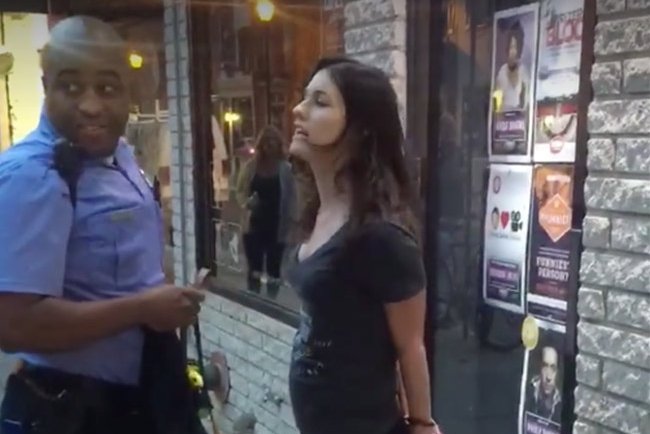
June 08, 2017
 Screenshot from video/Wil Sylvince/Facebook
Screenshot from video/Wil Sylvince/Facebook
Wil Sylvince, a New York-based comic, posted a video to Facebook in June of Colleen Campbell yelling obscenities at a Philadelphia police officer outside of Helium Comedy Club in Center City. It was viewed more than 12 million times before Sylvince removed it from Facebook.
When I opened social media on Tuesday morning I saw the name “Colleen Campbell” everywhere. That is thanks to a video that has been viewed more than a four million times that shows the white 28-year-old PHL17 reporter, Colleen Campbell, berating a police officer outside of the Helium Comedy Club in a matter that can only be described as disturbing. Some of the lingual pearls that came out of her mouth toward the police officer on the scene were “lick my a**hole” and “no wonder everybody wants to blow your f***ing heads off.” The officer eventually calmly arrested Campbell after she apparently spits on a bystander. By the next morning she was already at home and interviewed by Philly Magazine.
 Source/LinkedIn
Source/LinkedInAbraham Gutman
The video reveals a more profound reality though – the shielding power of white privilege.
Let’s compare this viral video to the video of a 28-year-old black woman who found herself in a confrontation with a police officer. That woman was Sandra Bland and the video was the last time she was seen alive.
On July 10th, 2015, Sandra Bland was pulled over by a police officer in Prairie View, Texas, because she failed to signal a lane change.
Dashcam video of Bland’s stop was released. Bland was understandingly annoyed because, honestly, who gets stopped for failing to signal a lane change?! She complied with the police officers and at some point, while writing her warning, the officer asks her “you OK? ... You seem very irritated.” Bland answers directly, “I am, I really am.” While they are talking Bland was smoking in her car and the police officer asked her to put out her cigarette. Then comes the moment that Bland supposedly didn’t comply and, to some people’s opinions, earned her a violent arrest.
“I’m in my car, why do I have to put out my cigarette?”
“Well you can step out on out now”
“I don’t have to step out of the car”
“Step out of the car”
The police officer opens the driver's seat door.
“You don’t have the right”
“Step out of the car”
After a few seconds of Bland asserting her rights, the officer reached into the car, saying “I’m going to yank you out of here.” Bland resists. From the dashcam footage you can see the officer physically trying to pull her out. After a few more seconds the officer pulls his Taser and tells Bland “I will light you up! Get out! Now!” Bland gets out, “Wow! really?! For a failure to signal.” She gets arrested violently.
Sandra Bland was found dead in her jail cell three days later.
After Bland’s death, in a conversation with then-Fox News host Megyn Kelly, Milwaukee County Sheriff David Clarke called the case “a classic case where a citizen did not comply with a law enforcement officer.” Clarke goes on to talk about the language Bland used and said that if she “had been my daughter, I’d have been embarrassed.” The first time Bland used any kind of profanity is after she is already in handcuffs and away from the dashcam image. Megyn Kelly, who in the past got offended by the suggestion that Santa Claus isn’t white, and recently gained praise since her move to NBC, concluded with “comply and complain later.” The subtext is clear – if only Bland would have complied she would probably be alive today.
Sandra Bland’s use of language.
Tamir Rice’s “menacing” height.
Michael Brown’s “demon”-like look.
Eric Garner’s weight.
Behind any incident of a black person not complying with law enforcement someone finds a way to demonize the eventual victim. To expose criminality. To show the threat. That is inherent in American history and culture. When whites don’t comply with police they get multiple chances to excuse themselves and leave quietly. To get arrested, Campbell needed to spit on someone in front of a police officer. Bland just didn’t put out her cigarette.
This is beyond just an anecdotal observation. Researchers from Stanford, who analyzed more than 100 hours of police body-camera data, published this week a study that shows police use less respectful language when talking to black people.
Colleen Campbell had the opportunity to leave the scene after cursing a police officer. Were she black, odds are that the event would have ended with her violently arrested. White privilege protected her.
It is worthy to praise the police officer in Campbell’s case. He was calm, acted correctly, was respectful and not physical. A call for justice and good policing doesn’t mean making police more violent and abusive in interactions with white people. It means that no interaction over a traffic violation, such as in Bland’s case, or a drunken mistake such as Campbell’s should end in tragedy, even if happened “while black.”
• • •
Abraham Gutman is an Israeli freelance writer currently based in Philadelphia who focuses on Israel/Palestine, race in America and policing. He holds a master's degree in economics from Hunter College, where he did research on stop-and-frisk policies, and works at the Center for Public Health Law Research at Temple University. His Twitter handle is @abgutman.